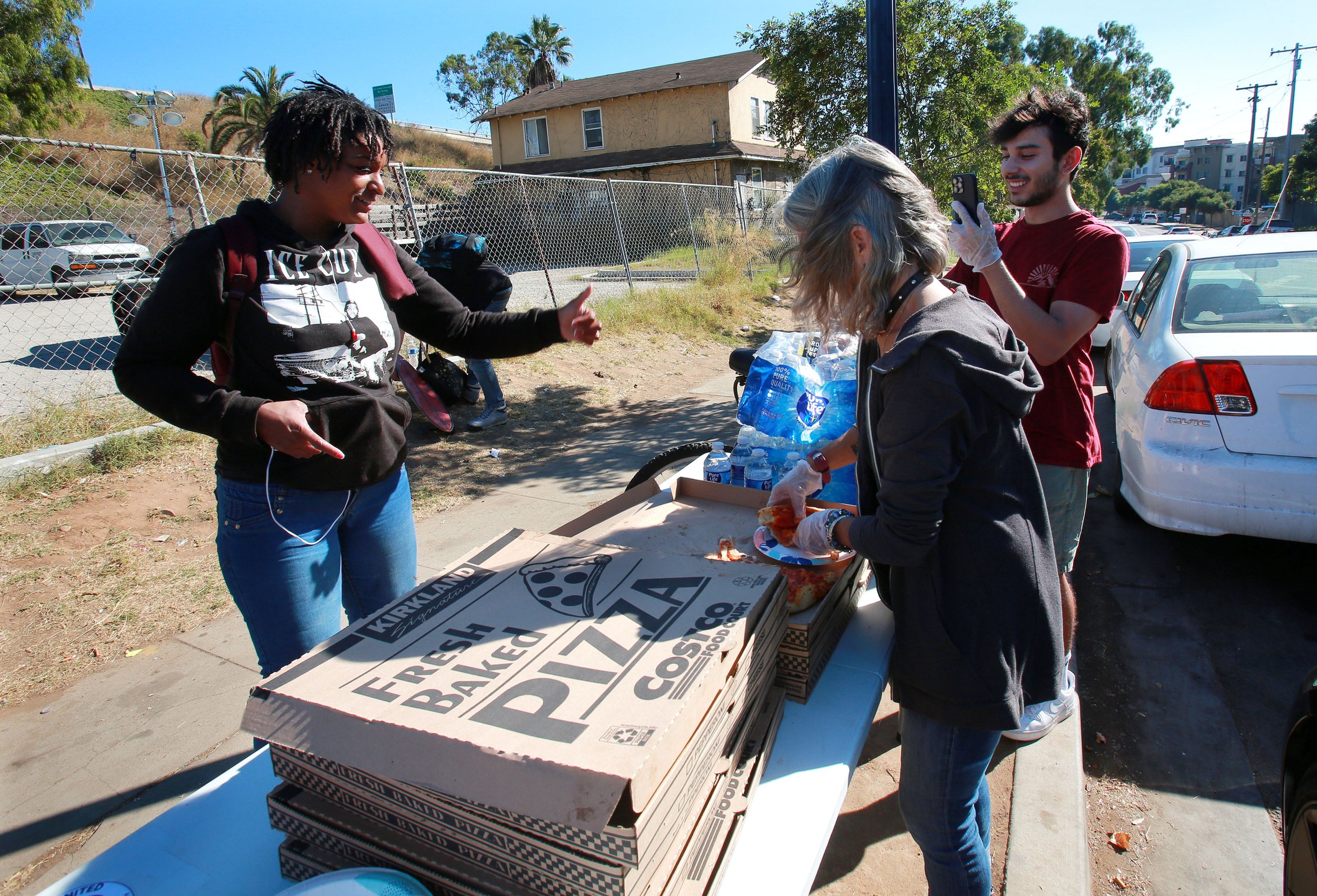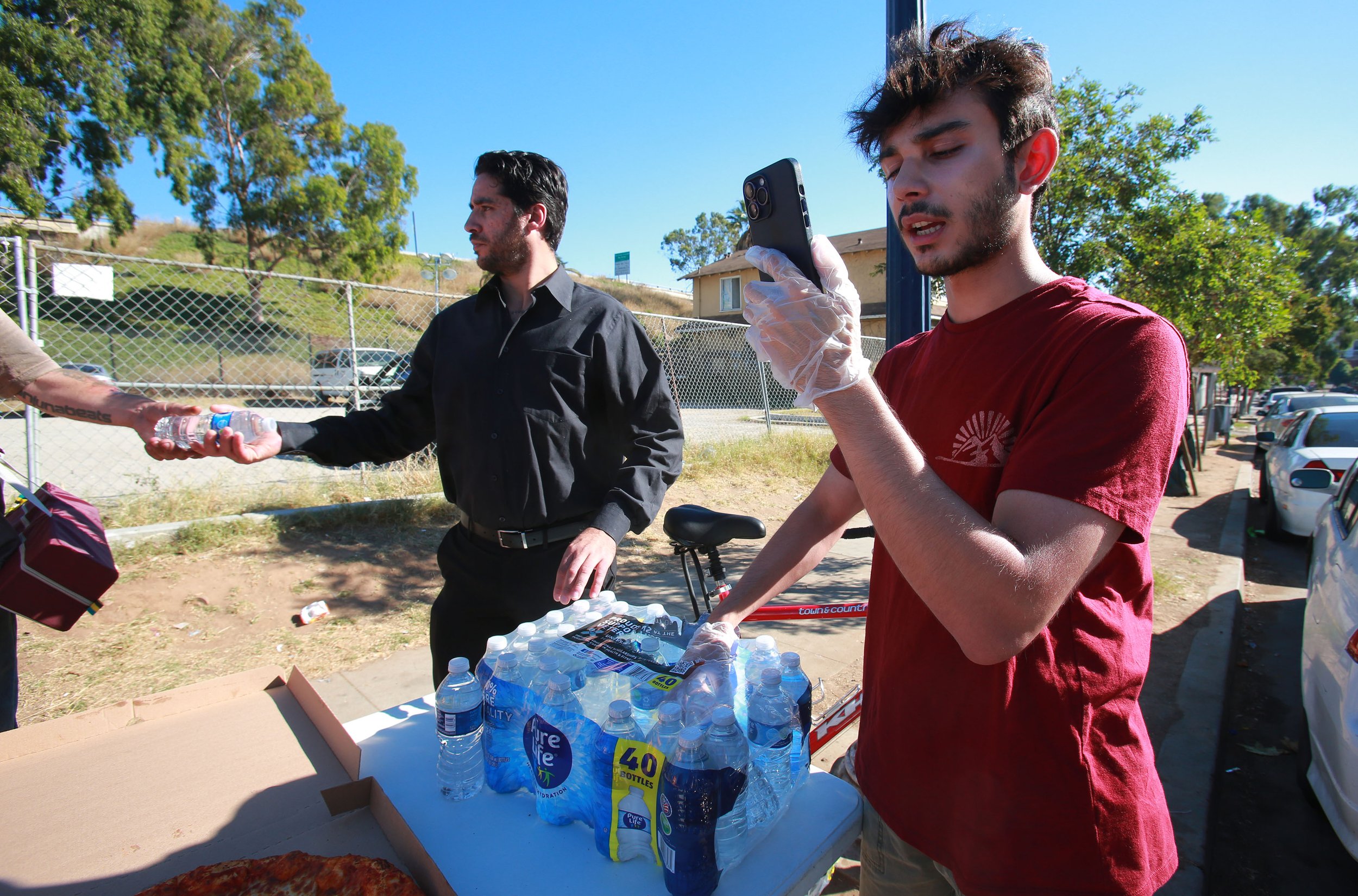Unhoused United
Mesean Sadri angles his Tesla into a last parking space at the end of 17th Street in San Diego’s East Village, just south of Imperial Avenue. At an intersection where most drivers roll up their windows and lock their doors as they pass through, Sadri, 23, bounces out of the car and pops the trunk. Two men who had been quietly smoking cigarettes in the shade across the street immediately gravitate towards him and his open trunk. One man positions his wheelchair at the edge of the curb, the other, with bloodshot eyes and a distant stare, steps right up to Sadri.
“Can we help you with that table?” they both ask. Sadri accepts the help, and together they assemble his two folding tables along the sidewalk. The men then patiently take their places at the front of the line while he ducks into the back seat, reemerging with large boxes of Costco pizza, plates, napkins and cases of water.
Slowly, others leave the shade to get in line for a slice, a bottle of water and a kind word. People emerge from tents lining the sidewalk on Imperial Avenue to join the queue. When everything is assembled and its time to pass out pizza and water, Sadri’s volunteer assistant Rachel Hayes, herself only recently housed after 11 years on the street in East Village, oversees an orderly process. Sadri, meanwhile, stands at the end of the table with his phone set on TikTok, explaining to his live audience of 1,500 on this particular Sunday that his nonprofit Unhoused United, survives on their donations. Viewers post comments and Sadri thanks them for their donations of $5, $25, $10 as the money comes in. Hayes will occasionally offer statistics of how many people in San Diego are homeless, how the recently initiated ban on camping in this area has impacted the unhoused, often making it difficult for social workers to find clients after police have told them to move. Hayes has become an outspoken advocate for more affordable housing, speaking at San Diego City Council meetings, with the media, and anyone else who will listen.
The donations keep coming in as Sadri explains they can click the link in his bio. He has Venmo, PayPal, Cash app, and Amazon Wish List.
“Hello Missouri, thank you for your donation, we really appreciate it. Again, we’re Unhoused United. Please like and share the live stream you guys so we can get donations to do this again next week. Thank you so much Brian. We rely on your donations, please donate - we really appreciate it.”
One of the few women to join the line for food and water thanks them loudly, and nods in the direction of the live stream, saying what a blessing it is for people to share food and show love for other people. Hayes adds a few choice comments. “San Diego has a housing problem, not a homeless problem,” she says.
Sadri graduated fro La Costa Canyon High School, then attended UC Berkeley, graduating in 2021. He took classes at their labor center, working with a housing rights committee in San Francisco that helps tenants fight eviction by corporate landlords. Seeing elderly and low income tenants overwhelmed by the idea of ending up poor and possibly homeless had a lasting impact on him.
“One elderly woman who was being evicted thanked us and said it was gratifying to see our cohort, of young people, with so much social awareness. She told us, ‘For people your age, finding a social issue and being socially conscious at your age is gratifying. Don’t give up.’”
Far from giving up, he is considering going to law school. “There is only so much you can do out here on the street. When you are with the people who are pulling the levers of power, when you have some form of power, I feel there is a lot more you can do when you have the law behind you, when you’re advocating tirelessly, when you’re educated on these sorts of issues,” he said. “I would love to just keep giving out pizza for my entire life, but I feel an urge to do more.”
Sadri initially started his operation in March of 2023 by bringing water. Then in May, when he felt he had developed enough of a rapport that people recognized and trusted him, he began bringing pizza. Streaming the operation live came from watching Shirley Raines of Beauty2thestreets on TikTok. Raines restores dignity to people living on the streets in L.A.’s Skid Row by providing hair, makeup and nail treatments, and offering a compassionate word.
He comes by his social consciousness naturally. His parents raised him and his sister “to be socioeconomically conscious,” he said. His older sister works in health care, focusing on disparities. When asked if his parents worry about him working alone in East Village, he said they just tell him “to stay vigilant and listen to my gut.” He enjoys filling them in on what his audience was like on TikTok and how the participants responded to the food and water, when he returns home Sunday evening. Only once has he dealt with a negative experience. A man who had come to the pizza feed several Sundays in a row grabbed a whole box one day and ran off with it. “I felt betrayed,” Sadri said. “I want to see the good in people, so that was hard.”
Over the months Sadri has learned that every person has a deep life experience, a set of unique events that landed them here. He has developed a deeper understanding of the complex lives and live stories of unhoused individuals. “I thought I was already empathetic,” he said. “But being out here made me a lot more empathetic, a lot more understanding, a lot more educated.”
He feels that the average housed person lacks that connection to the humanity in folks who might have a different outward appearance. A valuable lesson has been to learn de-escalation techniques. “On Commercial Street especially I’ve gotten really good at sussing out a situation - trying to meet people where they are. Rachel and I have served people who are not all there (in their minds) at the time. It’s just a matter of figuring out how to meet with them on their level. It’s just some times you need them to focus on you, get them to stop yelling, those sorts of things.”
Watching an entire block of people have to collect their belongings and move elsewhere is shocking to Sadri. “It’s violent, there’s no other way to put it. I’m floored at the inhumanity we are showing these people. It’s crazy. I couldn’t imagine having to pick up all my belongings and my home and having to move overnight, or in a few hours.”
As the empty pizza boxes begin to pile up, and the line of people waiting dwindles, Sadri returns to his TikTok audience. He moves the camera in an arc so the viewers can see the whole environment, not just the table of food and water. “We started off a small operation, but thanks to your generosity we’ve grown and we’re able to feed more and more people,” he tells his audience. “We really love and appreciate you guys. We’ll see you next week.”




